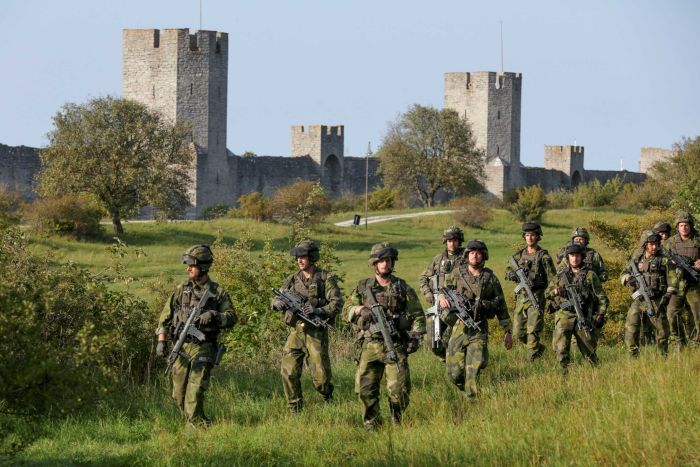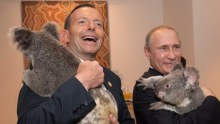Sweden returns to military conscription, citing Russia's annexation of Crimea as major reason
Posted
 Photo:
Swedish troops train on the island of Gotland in the Baltic. (Reuters: Soren Andersson/TT News Agency)
Photo:
Swedish troops train on the island of Gotland in the Baltic. (Reuters: Soren Andersson/TT News Agency)
Seven years after abolishing military conscription, Sweden has announced it will reintroduce the draft in order to bolster national security as tensions in the area rise.
Key points:
- Conscription will cover men and women born in 1999 or later
- 4,000 men and women will be required for training in 2018 and 2019
- Conscription was abolished in 2010 and pool of recruits has been shrinking
The country's Defence Minister cited Russia's annexation of Crimea as a major reason for the move, which will see 4,000 men and women called up for military service in 2018 — up from approximately 2,500 recruits per year.
Non-aligned Sweden ended compulsory military service in 2010, but military activity in the Baltic region has increased since then, prompting Sweden to step up its military preparedness.
"We have a Russian annexation of Crimea, we have the aggression in Ukraine, we have more exercise activities in our neighbourhood," Defence Minister Peter Hultqvist said.
"So we have decided to build a stronger national defence. The decision to activate conscription is part of that."
The reintroduction of the draft will cover men and women born in 1999 or later, though only a small minority will be selected to serve.
Mr Hultqvist said motivation would be an important factor when selecting the recruits for service.
Sofia Hultgren, who turns 17 later this year and thus could be drafted in coming years, said many young Swedes viewed lengthy careers as military professionals as something odd and old-fashioned.
"I think many see it as something lame, something your father did, when there are so much other fun things to do," the student said.
Military service was the norm for young Swedish men during the Cold War, but conscription was gradually watered down after the collapse of the Soviet Union as war in the region looked increasingly unlikely.
But a resurgent Russia and tensions over the conflict in Ukraine have left politicians on both sides of the aisle looking to boost military capability and address the lack of talent keen on making a career as a professional soldier.
Military spending on the rise after significant dip
Signs of a lack of military preparedness have cropped up in recent years.
In 2013, Russian warplanes carried out a mock bombing run within 40 kilometres of Swedish territory, catching air defences napping.
Sweden had to rely on Denmark's air force to respond to what NATO labelled a "simulated nuclear attack".
Swedish military expenditure has fallen from 2.5 per cent of GDP in 1991, around the time the Soviet Union collapsed, to 1.1 per cent of GDP in 2015, data from the Stockholm International Peace Research Institute (SIPRI) showed.
Sweden, which is not a NATO member, has since increased spending and reassigned troops to the Baltic Sea island of Gotland, which sits in between Sweden and Latvia.
It has also urged local governments to step up contingency planning for a future war.
ABC/Reuters
Topics: defence-and-national-security, government-and-politics, world-politics, sweden







